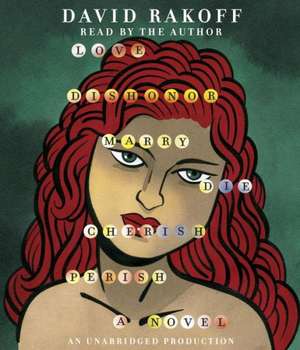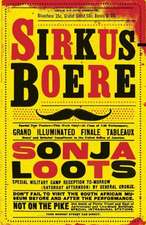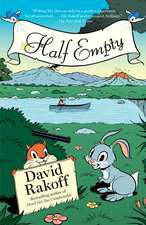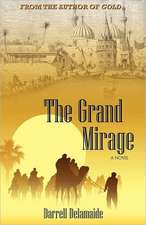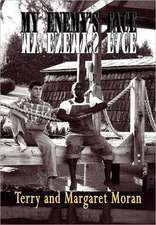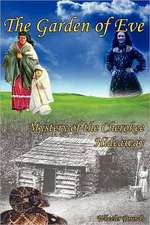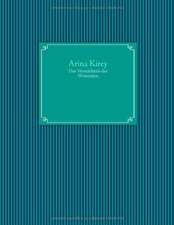Love, Dishonor, Marry, Die, Cherish, Perish
Autor David Rakoffen Limba Engleză CD-Audio – 15 iul 2013
Vezi toate premiile Carte premiată
Audies (2014)
Through his books and his radio essays for NPR's This American Life, David Rakoff has built a deserved reputation as one of the finest and funniest essayists of our time. Written with humor, sympathy, and tenderness, this intricately woven novel proves him to be the master of an altogether different art form.
LOVE, DISHONOR, MARRY, DIE, CHERISH, PERISH leaps cities and decades as Rakoff sings the song of an America whose freedoms can be intoxicating, or brutal.
The characters' lives are linked to each other by acts of generosity or cruelty. A daughter of Irish slaughterhouse workers in early-twentieth-century Chicago faces a desperate choice; a hobo offers an unexpected refuge on the rails during the Great Depression; a vivacious aunt provides her clever nephew a path out of the crushed dream of postwar Southern California; an office girl endures the casually vicious sexism of 1950s Manhattan; the young man from Southern California revels in the electrifying sexual and artistic openness of 1960s San Francisco, then later tends to dying friends and lovers as the AIDS pandemic devastates the community he cherishes; a love triangle reveals the empty materialism of the Reagan years; a marriage crumbles under the distinction between self-actualization and humanity; as the new century opens, a man who has lost his way finds a measure of peace in a photograph he discovers in an old box—an image of pure and simple joy that unites the themes of this brilliantly conceived work.
Rakoff's insistence on beauty and the necessity of kindness in a selfish world raises the novel far above mere satire. A critic once called Rakoff "magnificent," a word that perfectly describes this wonderful novel in verse.
From the Hardcover edition.
Preț: 115.82 lei
Nou
Puncte Express: 174
Preț estimativ în valută:
22.16€ • 23.70$ • 18.48£
22.16€ • 23.70$ • 18.48£
Indisponibil temporar
Doresc să fiu notificat când acest titlu va fi disponibil:
Se trimite...
Preluare comenzi: 021 569.72.76
Specificații
ISBN-13: 9780385392907
ISBN-10: 0385392907
Dimensiuni: 127 x 150 x 15 mm
Greutate: 0.11 kg
Ediția:Completă
Editura: Random House Audio Publishing Group
ISBN-10: 0385392907
Dimensiuni: 127 x 150 x 15 mm
Greutate: 0.11 kg
Ediția:Completă
Editura: Random House Audio Publishing Group
Notă biografică
David Rakoff was the New York Times bestselling author of the books Fraud, Don't Get Too Comfortable, and Half Empty. A two-time recipient of the Lambda Literary Award and winner of the Thurber Prize for American Humor, he was a regular contributor to This American Life. He died in August 2012 at the age of forty-seven, shortly after finishing this book.
Extras
Helen harbors the hope that the passing five years
Have made folks forget both the vomit and tears
And throwing of glassware and drunken oration,
That half-hour tirade of recrimination
Where, feeling misused, she had got pretty plastered,
And named His name publicly, called him a bastard.
The details are fuzzy, though others have told her
She insulted this one and cried on that shoulder,
Then lurched ’round the ballroom, all pitching and weaving
And ended the night in the ladies’ lounge, heaving.
How had it begun, before things all turned rotten?
She can pinpoint the day, she has never forgotten
How he came to her desk and leaned over her chair
To look at some papers, and then smelled her hair.
“Gardenias,” he’d said, his voice sultry and lazy
And hot on her ear, Helen felt she’d gone crazy.
“A fragrance so heady it borders on sickly,”
He’d purred at her neck and then just as quickly
Was back to all business, demanding she call
Some client, as if he’d said nothing at all.
She was certainly never an expert at men,
But an inkling was twinkling, especially when
The next day he all but confirmed Helen’s hunch.
When he leaned from his office and asked her to lunch.
Their talk was all awkward and formal to start
He said that he found her efficient and smart.
She thanked him, then stopped, she was quite at a loss.
She’d never before really talked to her boss.
They each had martinis, which helped turn things mellow,
He asked where she lived, and if she had a fellow.
He reached for her hand and asked, “Will you allow
An old man to wonder who’s kissing you now?”
It was close and convenient, his spare midtown rental.
And after, more drinks at a bar near Grand Central
To sit once again in uncomfortable silence
Like two guilty parties to some kind of violence.
They sipped among other oblivion seekers,
While June Christy sang from the bar’s tinny speakers.
He settled the bill and they got to their feet,
And emerged from the afternoon hush to the street.
They walked arm in arm in some crude imitation
Of other real couples en route to the station.
Such leisurely strolling, although it’s grown late
Against her best judgment it feels like a date.
His booze-cloud blown over, now happy, near beaming
He stops at a window of cutlery, gleaming,
He points out the wares, taking note of a set that
He likes best of all, then he says, “We should get that.”
She knows it’s a joke, all this idle house-playing
But briefly she hopes that he means what he’s saying.
Her presence, she thinks, is what’s rendered him gladder
But really it’s just that he aimed for, and had her.
The hideous reason behind his new glow is
What Helen—and many just like her—don’t know is
That men’s moods turn light and their spirits expand,
The moment they sense an escape is at hand.
He patted her cheek as he said, “I’m replenished,”
Then off through the crowd for the next train to Greenwich.
Helen pictured his house with its broad flagstone path.
The windows lit up, a child fresh from the bath,
And wondered if she might just smell on his skin,
The coppery scent of their afternoon sin.
At her desk the next Monday it was business as always.
There were no words exchanged, not a glance in the hallways.
With relief, Helen thought, Well that’s that. Nevermore.
’Til Friday (again) at his pied-à-terre door.
And Friday thereafter, and each after that
For close to two years, ’til their actions begat
What such actions are wont to when caution’s ignored.
The cure was a thing she could scarcely afford.
They talked in his office behind the closed door.
(She could tell from his face that he’d been there before.)
In the envelope left the next day on her desk,
Was two hundred cash and a downtown address.
She’d never had visions of roses or cupids,
From the beginning she wasn’t that stupid.
What you don’t hope for can’t turn ’round to hurt you.
Besides, she had long before given her virtue.
There hadn’t been untoward coaxing or urging
This wasn’t The Ogre Defiling The Virgin
He’s older than she, but they’d both played the game
Of never once speaking the other one’s name.
Their mutual distance a plan jointly hatched
To keep things unserious, flip, and detached.
It was—truth be told, when she coolly reflected—
Not all that much different from what she’d expected.
Expected, she thought, and it sounded absurd.
How long had it been since she’d uttered that word?
And yet there were moments—unbarred, undefended—
When Helen concocted, cooked up, and pretended
She had all the trappings that go with the life of
The thoroughly satisfied, marrified wife of
A man who might keep her, despite the new battle
That said wives were really no better than chattel,
The difference too scant between “bridal” and “bridle”
And girls who’d had everything, now suicidal,
Finally finding their voices to speak
Of their feminine fetters, this loathsome mystique;
This problem that theretofore hadn’t a name
And still, Helen couldn’t resist, just the same,
To wonder, how might such a cared-for existence
Feel after decades of hard-won subsistence.
A mistress of manor, so calm, so serene
To know that there nowhere was any vitrine
Whose silvery wares would be ever denied her.
Have made folks forget both the vomit and tears
And throwing of glassware and drunken oration,
That half-hour tirade of recrimination
Where, feeling misused, she had got pretty plastered,
And named His name publicly, called him a bastard.
The details are fuzzy, though others have told her
She insulted this one and cried on that shoulder,
Then lurched ’round the ballroom, all pitching and weaving
And ended the night in the ladies’ lounge, heaving.
How had it begun, before things all turned rotten?
She can pinpoint the day, she has never forgotten
How he came to her desk and leaned over her chair
To look at some papers, and then smelled her hair.
“Gardenias,” he’d said, his voice sultry and lazy
And hot on her ear, Helen felt she’d gone crazy.
“A fragrance so heady it borders on sickly,”
He’d purred at her neck and then just as quickly
Was back to all business, demanding she call
Some client, as if he’d said nothing at all.
She was certainly never an expert at men,
But an inkling was twinkling, especially when
The next day he all but confirmed Helen’s hunch.
When he leaned from his office and asked her to lunch.
Their talk was all awkward and formal to start
He said that he found her efficient and smart.
She thanked him, then stopped, she was quite at a loss.
She’d never before really talked to her boss.
They each had martinis, which helped turn things mellow,
He asked where she lived, and if she had a fellow.
He reached for her hand and asked, “Will you allow
An old man to wonder who’s kissing you now?”
It was close and convenient, his spare midtown rental.
And after, more drinks at a bar near Grand Central
To sit once again in uncomfortable silence
Like two guilty parties to some kind of violence.
They sipped among other oblivion seekers,
While June Christy sang from the bar’s tinny speakers.
He settled the bill and they got to their feet,
And emerged from the afternoon hush to the street.
They walked arm in arm in some crude imitation
Of other real couples en route to the station.
Such leisurely strolling, although it’s grown late
Against her best judgment it feels like a date.
His booze-cloud blown over, now happy, near beaming
He stops at a window of cutlery, gleaming,
He points out the wares, taking note of a set that
He likes best of all, then he says, “We should get that.”
She knows it’s a joke, all this idle house-playing
But briefly she hopes that he means what he’s saying.
Her presence, she thinks, is what’s rendered him gladder
But really it’s just that he aimed for, and had her.
The hideous reason behind his new glow is
What Helen—and many just like her—don’t know is
That men’s moods turn light and their spirits expand,
The moment they sense an escape is at hand.
He patted her cheek as he said, “I’m replenished,”
Then off through the crowd for the next train to Greenwich.
Helen pictured his house with its broad flagstone path.
The windows lit up, a child fresh from the bath,
And wondered if she might just smell on his skin,
The coppery scent of their afternoon sin.
At her desk the next Monday it was business as always.
There were no words exchanged, not a glance in the hallways.
With relief, Helen thought, Well that’s that. Nevermore.
’Til Friday (again) at his pied-à-terre door.
And Friday thereafter, and each after that
For close to two years, ’til their actions begat
What such actions are wont to when caution’s ignored.
The cure was a thing she could scarcely afford.
They talked in his office behind the closed door.
(She could tell from his face that he’d been there before.)
In the envelope left the next day on her desk,
Was two hundred cash and a downtown address.
She’d never had visions of roses or cupids,
From the beginning she wasn’t that stupid.
What you don’t hope for can’t turn ’round to hurt you.
Besides, she had long before given her virtue.
There hadn’t been untoward coaxing or urging
This wasn’t The Ogre Defiling The Virgin
He’s older than she, but they’d both played the game
Of never once speaking the other one’s name.
Their mutual distance a plan jointly hatched
To keep things unserious, flip, and detached.
It was—truth be told, when she coolly reflected—
Not all that much different from what she’d expected.
Expected, she thought, and it sounded absurd.
How long had it been since she’d uttered that word?
And yet there were moments—unbarred, undefended—
When Helen concocted, cooked up, and pretended
She had all the trappings that go with the life of
The thoroughly satisfied, marrified wife of
A man who might keep her, despite the new battle
That said wives were really no better than chattel,
The difference too scant between “bridal” and “bridle”
And girls who’d had everything, now suicidal,
Finally finding their voices to speak
Of their feminine fetters, this loathsome mystique;
This problem that theretofore hadn’t a name
And still, Helen couldn’t resist, just the same,
To wonder, how might such a cared-for existence
Feel after decades of hard-won subsistence.
A mistress of manor, so calm, so serene
To know that there nowhere was any vitrine
Whose silvery wares would be ever denied her.
Recenzii
"An extraordinarily and deliriously entertaining work....hearfelt, charmingly profound....[a] giddy, wistful triumph"
--Paul Rudnick, The New York Times Book Review
“Suffused with joyful invention. Readers may come to the book to pay their respects, but they will leave rejuvenated by the splendor of the warmth and wordplay. Composed a hand-span’s distance from death, it feels death-defying….irrepressibly funny, and even strangely uplifting, in jubilant verse….If this book must serve as his memorial, it’s at least as life-affirming as any that a writer has left behind”
—Wall Street Journal
"Sly, bravura....a marvel of gamesmanship, Mr. Rakoff describes hardship, illness, death and depravity, knowing how ingeniously his book’s style and substance would fight each other....gift for balancing truth telling and humor....future readers can turn to this book to remember why he was so widely appreciated and is sorely missed"
--Janet Maslin, The New York Times
“The literary rhythm captures the steady momentum of American progress….poignant….beautiful and melancholy….with a final image that made my eyes well up….funny and heartbreaking and, like Rakoff himself, not easy to forget”
--Entertainment Weekly, A
“Ingenius, delicately haunting…..probing, poignant, and wickedly funny….illuminate[s] the many stages of life”
--O Magazine
“It’s terrific: a sweeping narrative of the 20th century that encompasses personal tragedy, family secrets and broad social movements while going down as easy as a bite of crème brûleé”
—Gregory Cowles, The New York Times Book Review
“Reading the new novel in verse by David Rakoff, you can hear his voice again, wordy, so witty, a little worried, and always wise…..His mordant humor, his compassionate vision, his moral questioning, his sharp honesty, they’re all intimately wedded to the meter and the zestful diction of the book…..But the new direction he takes in “Love, Dishonor, Marry, Die, Cherish, Perish” brings out the best in him, too, as he fits his voice into a tighter form without ever becoming a slave to that form. He is as vital, as blackly comic, as bursting forth with detail, as vernacular, and as poignant in metered verse as he is in his effortlessly long prose sentences. Each couplet here equally serves the structural rules, the story, and Rakoff’s matchless sensibility….The narrative is ambitious and has sweep…Agile, vivid, and entertaining”
—Boston Globe
“Even at six vivid verbs, the title doesn’t do justice to the breadth of this short, acrid, elusive, entrancing book.”
--Bloomberg
"Inspired...accessible, delightful....powerful.... alluringly designed by Chip Kidd and illustrated by the cartoonist Seth, is filled with the sly, sharp social commentary that made Rakoff such a favorite....What shines through in this novel, even more than in his nonfiction, is a piercing, wistful appreciation for life, love and art....deserves to become a classic.....a rare bird: moving, amusing, lilting, crushing."
--Heller McAlpin, NPR
“I just marveled at his words….What he’s created in this book is Seussian”
—Ira Glass, in an interview with O Magazine
“Beautiful and heartbreaking....delightful.... hilarious and lewd and shot through with a longing for life”
--New York Times
“A novel in rhyming couplets narrated in iambic tetrameter? Why not?... Along the way, you can have a lot of fun, no matter how serious the subject — family, sometimes alienating, sometimes consoling — because of the rhymes. Rakoff makes such pairings as virago and Chicago, ceases and paresis, skittish and Yiddish, antelope and envelope, horas and Torahs, Alzheimer's and climbers, for 100 cleverly rendered and entertaining pages.”
—Alan Cheuse, NPR.org
"[A] tour de force novel-in-verse....It is hard not to feel celebratory over its heart-singing smarts, its existence as a fist raised against a life ending. What melancholia is there is confined to its characters — it’s a triumphant, moving work of true craft and wit."
--Austin American-Statesman
"Truly singular....There is so much bound up in the novel's singsong verse: stories about AIDS and Alzheimer's, altruism, art, lives linked together by buried incidents that spring up again to bear unexpected fruit."
--Ira Glass, The Atlantic
“Rakoff marries deft, humane observation with jauntily tripping verse structure — in places, you'll find yourself thinking of Dr. Seuss — to create a series of jewel-toned interlocking miniatures.”--NPR.org
“[A] marvelously barbed novel in verse.”
ߝElissa Schappell, Vanity Fair’s “Hot Type”
"Mesmerizing....Combines his wit and his gravity....Astounding"
--Publishers Weekly
"A fitting memorial to a humorist whose embrace of life encompassed its dark side....[the book] retains a spirit of sweetness and light, even as mortality and inhumanity provide a subtext.....Strong work. It deepens the impact that this was the last book completed by the author."
--Kirkus Reviews
From the Hardcover edition.
--Paul Rudnick, The New York Times Book Review
“Suffused with joyful invention. Readers may come to the book to pay their respects, but they will leave rejuvenated by the splendor of the warmth and wordplay. Composed a hand-span’s distance from death, it feels death-defying….irrepressibly funny, and even strangely uplifting, in jubilant verse….If this book must serve as his memorial, it’s at least as life-affirming as any that a writer has left behind”
—Wall Street Journal
"Sly, bravura....a marvel of gamesmanship, Mr. Rakoff describes hardship, illness, death and depravity, knowing how ingeniously his book’s style and substance would fight each other....gift for balancing truth telling and humor....future readers can turn to this book to remember why he was so widely appreciated and is sorely missed"
--Janet Maslin, The New York Times
“The literary rhythm captures the steady momentum of American progress….poignant….beautiful and melancholy….with a final image that made my eyes well up….funny and heartbreaking and, like Rakoff himself, not easy to forget”
--Entertainment Weekly, A
“Ingenius, delicately haunting…..probing, poignant, and wickedly funny….illuminate[s] the many stages of life”
--O Magazine
“It’s terrific: a sweeping narrative of the 20th century that encompasses personal tragedy, family secrets and broad social movements while going down as easy as a bite of crème brûleé”
—Gregory Cowles, The New York Times Book Review
“Reading the new novel in verse by David Rakoff, you can hear his voice again, wordy, so witty, a little worried, and always wise…..His mordant humor, his compassionate vision, his moral questioning, his sharp honesty, they’re all intimately wedded to the meter and the zestful diction of the book…..But the new direction he takes in “Love, Dishonor, Marry, Die, Cherish, Perish” brings out the best in him, too, as he fits his voice into a tighter form without ever becoming a slave to that form. He is as vital, as blackly comic, as bursting forth with detail, as vernacular, and as poignant in metered verse as he is in his effortlessly long prose sentences. Each couplet here equally serves the structural rules, the story, and Rakoff’s matchless sensibility….The narrative is ambitious and has sweep…Agile, vivid, and entertaining”
—Boston Globe
“Even at six vivid verbs, the title doesn’t do justice to the breadth of this short, acrid, elusive, entrancing book.”
--Bloomberg
"Inspired...accessible, delightful....powerful.... alluringly designed by Chip Kidd and illustrated by the cartoonist Seth, is filled with the sly, sharp social commentary that made Rakoff such a favorite....What shines through in this novel, even more than in his nonfiction, is a piercing, wistful appreciation for life, love and art....deserves to become a classic.....a rare bird: moving, amusing, lilting, crushing."
--Heller McAlpin, NPR
“I just marveled at his words….What he’s created in this book is Seussian”
—Ira Glass, in an interview with O Magazine
“Beautiful and heartbreaking....delightful.... hilarious and lewd and shot through with a longing for life”
--New York Times
“A novel in rhyming couplets narrated in iambic tetrameter? Why not?... Along the way, you can have a lot of fun, no matter how serious the subject — family, sometimes alienating, sometimes consoling — because of the rhymes. Rakoff makes such pairings as virago and Chicago, ceases and paresis, skittish and Yiddish, antelope and envelope, horas and Torahs, Alzheimer's and climbers, for 100 cleverly rendered and entertaining pages.”
—Alan Cheuse, NPR.org
"[A] tour de force novel-in-verse....It is hard not to feel celebratory over its heart-singing smarts, its existence as a fist raised against a life ending. What melancholia is there is confined to its characters — it’s a triumphant, moving work of true craft and wit."
--Austin American-Statesman
"Truly singular....There is so much bound up in the novel's singsong verse: stories about AIDS and Alzheimer's, altruism, art, lives linked together by buried incidents that spring up again to bear unexpected fruit."
--Ira Glass, The Atlantic
“Rakoff marries deft, humane observation with jauntily tripping verse structure — in places, you'll find yourself thinking of Dr. Seuss — to create a series of jewel-toned interlocking miniatures.”--NPR.org
“[A] marvelously barbed novel in verse.”
ߝElissa Schappell, Vanity Fair’s “Hot Type”
"Mesmerizing....Combines his wit and his gravity....Astounding"
--Publishers Weekly
"A fitting memorial to a humorist whose embrace of life encompassed its dark side....[the book] retains a spirit of sweetness and light, even as mortality and inhumanity provide a subtext.....Strong work. It deepens the impact that this was the last book completed by the author."
--Kirkus Reviews
From the Hardcover edition.
Premii
- Audies Finalist, 2014
